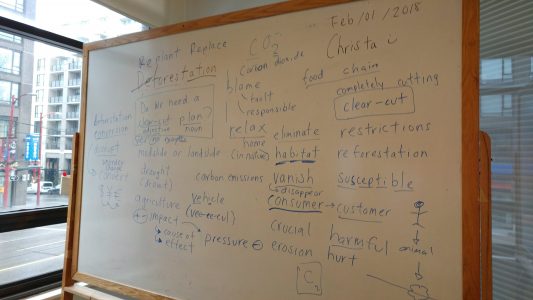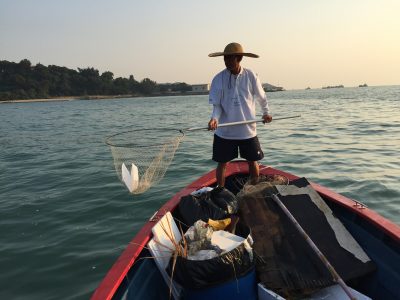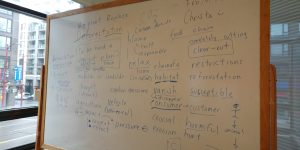
Volunteering is one way I pursuit my life-long journey of learning!
This is one thing I keep in mind whenever I volunteer as a Facilitator at weekly English Conversation Programs at the UBC Learning Exchange. While I teach speaking skills, vocabulary, and pronunciation at the Learning Exchange, I'm also always learning from the patrons I meet as we exchange stories, skills, and laughs!
The UBC Learning Exchange is a centre
in the heart of Vancouver's Chinatown and Downtown Eastside that offers free programs such as English Conversation Circles, computer use, arts and crafts, and is a space for community members to gather.
As an English Conversation Program Facilitator, I am responsible for preparing a lesson plan and guiding discussion for ESL learners on topics selected by the Program Coordinator. Typically, I like to start classes with a fun icebreaker and some opening questions to introduce the topic followed by some reading out loud and short videos to spark discussion and uncover new vocabulary. Since I began in the fall of 2017 we have covered a variety of topics, some of my favourites being ocean pollution, human genetic engineering, and International Women's Day!
What Makes a Good Conversation Facilitator?
As a facilitator, my role is to shine a spotlight on learners and their ideas! With that in mind, one of my key roles is to foster a low-barrier, light-hearted environment that allows learners to comfortably share their opinions and build their confidence in speaking.
My mission is to always:
- Talk less, listen more. This means using active listening skills to, rather than interject with my own explanations and opinions, use non-verbal body language to show that I am listening and redirect questions to the group that encourage learners' to share their ideas with each other.
- Make it fun! As our English Conversation Group is also a social group, fun and creative activities allow learners to get to know each other and also make stronger connections to the class topics.
Teaching as a Learning Process
As I continue to develop my teaching and facilitation skills, having the flexibility to experiment and adapt my teaching methods to what works best for my learners is always an ongoing learning process.

-
-
- Here are some of my favourite creative activities that I have tried so far:
-
-
- Storytelling relay- A picture is shown to the group and each learner says 1 sentence to piece together a story about it.
- Pictionary/charades- Learners' draw or act out key vocabulary on the class topic.
- 1-minute debate- Each learner around the table shares a 1-minute for or against argument on the class topic.
- Crafts (ex. Making origami compost bins if the topic is on composting)
HERE ARE SOME SKILLS I PICK Up in Summary
- Facilitating English conversation classes to groups of 10 ESL learners with a focus on speaking, reading, and listening comprehension skills on current and relevant topics
- Developing lesson plans through research of appropriate learning resources like short videos, newspaper articles, and images.
